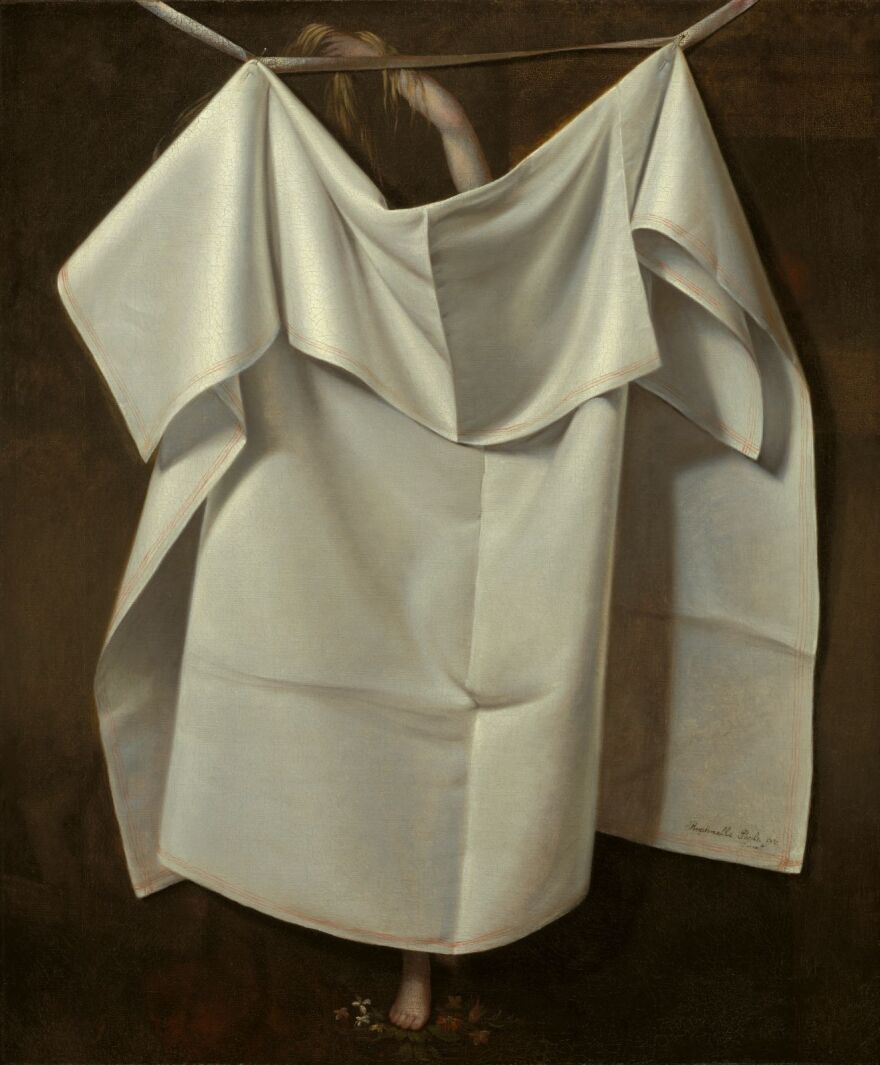This story was originally published on WHYY.
Having lost the Super Bowl earlier this month, it’s time for Philly to settle its betting debts.
The Philadelphia Museum of Art has decided on the painting it will be sending to its counterpart in Kansas City, the Nelson-Atkins Museum, per the Museum Bowl wager made before the game: Thomas Akins’ “Sailing,” an 1875 painting of a pair of men sailing a small boat on the Delaware River south of Philadelphia.
The pair is likely going sport hunting: On close inspection, viewers can see the two men have guns in the boat.
“It’s not because they’re out to get the bad guys,” said Jessica Todd Smith, the PMA’s director of curatorial initiatives. “They’re off to go birding in the marshes.”
The painting, which is currently in storage, is part of a collection of objects that rotate through the museum’s permanent Eakins gallery. It will be sent to Nelson-Atkins in time for the NFL draft at the end of April, an event expected to bring more visitors to Kansas City than any previous city event, ever.
The gift will be a short-term loan of a few months.
“Thomas Eakins is one of Philadelphia’s hometown heroes, is one of Philadelphia’s best-known artists. So we’re sending him on an adventure out West,” Smith said. “Eakins didn’t paint football because it wasn’t really a thing back in his day, but he painted boxing and rowing and sailing, as we see here. It felt in the spirit of the Super Bowl to choose this work.”
Eakins is widely revered in Philadelphia as a giant of 19th and early 20th-century American art, but less known in Kansas City. Aside from one major painting — a 7-foot tall, life-size portrait of Monsignor James P. Turner — the Nelson-Atkins collection is otherwise sparse when it comes to Eakins.
“We have a different Thomas that kind of obliterates everybody else: We have Thomas Hart Benton, the 20th-century American painter, born and raised in Missouri,” said William Rudolph, director of curatorial affairs at the Nelson-Atkins.
“For us in Kansas City, Benton is our American art totem in terms of people who knew him when he was alive, people who have been to his house, people who recognize models that he painted or locations where he worked,” Rudolph said. “We have our beloved Thomas, and hopefully this loan from Philadelphia will give the earlier Thomas – Thomas Eakins – a little bit of a boost.”
How exactly the Eakins will be displayed has not yet been determined.
“Obviously, we want the picture to have pride of place,” he said. “I mean, there’s no point in borrowing a great picture from the Philadelphia Museum of Art and hiding it in a corner.”
Rudolph has a personal affinity to Philadelphia and its museum: it’s where he started his career in museum work “when I was a baby,” i.e. from 1995 – 2004 when he bounced between several departments.
“I went to Bryn Mawr for graduate school. I say ‘wooder’ ice. I’m a Philadelphian through and through,” he admitted. “I was a little torn between who I should root for.”
He said the Eakins loan will give the Nelson-Atkins Museum opportunities to tell stories it could not have otherwise.
“We are a river city, but we don’t have the same kind of recreational water traffic that Philadelphia does on the Schuylkill,” Rudolph said. “There’s so many fun stories we can tell about the painting itself, about what it means to Philadelphia, about what it represented then and now.”
Had the tables been turned, with the Eagles winning the game and the Nelson-Atkins giving up a painting on loan, Rudoplph would have sent “Venus Rising from the Sea – A Deception” (1822), an optical illusion painting by Raphaelle Peale, part of the Peale artistic dynasty of early Philadelphia.

Win or lose, either way, this museum Super Bowl wager would have centered the Philadelphia story.
“We are the winners here. But, you know, Philadelphia is also the winner because I hope this will alert our visitors to one of the great treasures of the Philadelphia Museum of Art,” Rudolph said.
The Museum Bowl-friendly wager has been happening for several years around the Super Bowl, with museums from the rival teams wagering art loans. Unlike other friendly wagers, which often involve signature foods or regional crafts, an art loan takes a significant toll in terms of coordinating curators, art handlers, and insurance.
Smith said it usually takes a year or more of planning to safely and securely move an object from one museum to another. To do it in a matter of weeks is something short of miraculous.
But, Smith said, it’s worth it.
“People in the museum get very excited about this competition,” she said. “It’s a friendly rivalry, and also a nice way to foster our partnerships and relationships with other institutions.”
For the record, Philadelphia’s public radio station, WHYY, has also settled its Super Bowl wager with KCUR by sending the staff Philly-style cheesesteaks.




